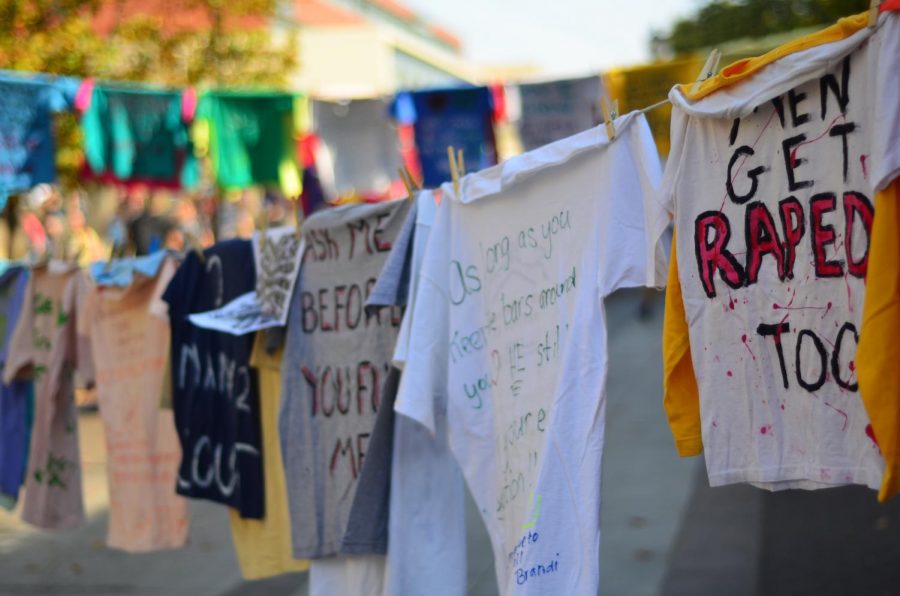Speak out for male survivors of assault
College-age men often harassed, assaulted but don’t feel comfortable telling others due to stigma
KYLE KOCH | Daily Evergreen File
YWCA’s Clothesline Project in November encourages men and women to talk about sexual assault and brings awareness to the issue.
April 19, 2018
Sexual assault awareness month brought support to women across campus through events like the REDress Project, hosted by the Native American Women’s Association, and the teal ribbon event hosted by Men for Social Change, a group I’m a member of.
This month is often considered solely for women, but they are not the only ones affected by sexual assault.
This is an issue that affects men too, both physically and sexually. We have heard so few of the affected male voices that the term sexual assault is now associated generally with women. We need to talk about men instead of leaving them in silence.
Opening up an advocacy for men does not take away from the struggles that women face. Both issues are legitimate.
Kyle Collins, a student whose boss has dealt with harassment, said that he sees men stay silent all the time. Even though his boss made clear that anyone dealing with harassment could speak up, Collins said that none of his peers would say anything out of fear of being shamed.
A lot of this comes from the way men and women are socialized, Collins said.
“A lot of guys get raised knowing that you never hit a female,” Collins said. “You get told that it’s not right to do. Females get told that men will never hit you. Then a woman gets mad and starts hitting a guy. It’s f—– up. They know that they just hit you, and you can’t do s— about it.”
Collins discussed the physical and biological differences men and women might have. A punch from a larger and stronger person could potentially do more damage, but that doesn’t mean that abuse from a smaller person should be ignored.
According to the Partner Abuse State of Knowledge Project, female perpetrators have higher rates of intimate partner violence than male perpetrators among young people.
Young women across our nation are more likely to hit a man, yet we don’t discuss the physical and mental torment that those men endure.
Collins said men can also have a difficult time leaving their abuser.
“Men do the same thing as women,” Collins said. “They’ll say, ‘Oh no, it’s fine. I love her.’ ”
Domestic assault is not the only issue men face. Collins said harassment and sexual assault also affect men, although they usually brush it off. Collins has observed sexual harassment directed at men, which usually leads to discomfort.
“Some people will be like, ‘I’m not very comfortable with that,’ ” Collins said. “And then the other guy will be like, ‘Calm down, it’s just a joke.’ ”
But harassment is not a joke. Men should be allowed to say no without being told to calm down. It’s OK to voice that you’re uncomfortable.
Just like the silencing of sexual harassment, rape is frequently muted. According to the Rape, Abuse and Incest National Network, college men are five times more likely to be raped than non-student men of the same age. We never hear about this on campus, though.
We know college is a dangerous place for women. Documentaries like “The Hunting Ground” have highlighted this danger. We need to have the same awareness for men.
Collins said that even if he were to tell his friends about an assault, their responses would be less than supportive.
“You’ll hear guys say, ‘You can’t get f—— raped, you little b—-,’ ” Collins said. “ ‘You’re a guy.’ ”
The idea that men cannot be raped is wrong. Men and women should be able to come forward with no stigmas attached. You are not any less of a man if you have been taken advantage of or assaulted. Any sexual encounter that you have not fully consented to is wrong.
We live in a culture of silence. The only way to break this pattern is to speak up.
Talking about these issues makes them real. The more men who come forward — and the more people who support them — the more progress we make toward an environment of inclusivity.










